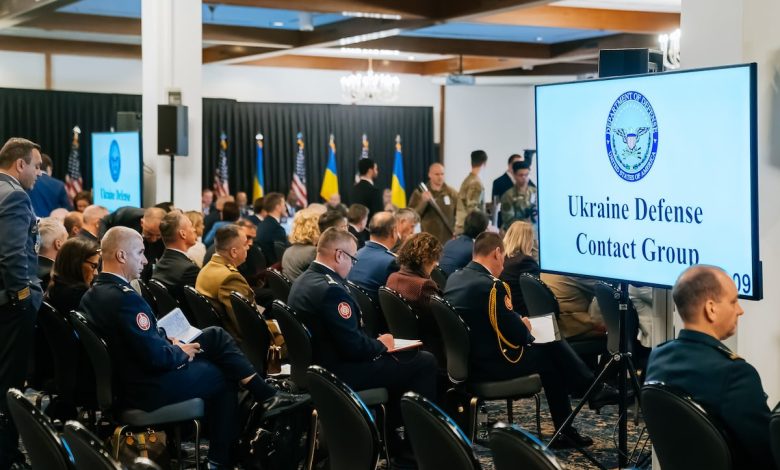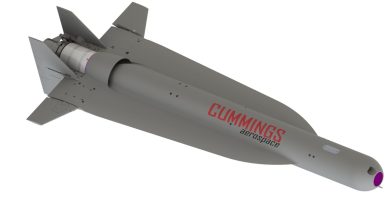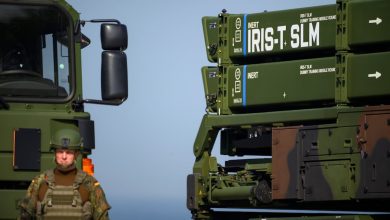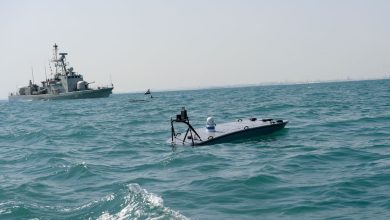Key European defense chiefs want Ukraine aid group to remain active

COLOGNE and PARIS — Top defense officials from Europe’s biggest military spenders want the international Ukraine Defense Contact Group to continue working after Donald Trump assumes the U.S. presidency, which many analysts here believe will not be as favorable to Kyiv as the Biden White House.
The 50-plus nation forum, also known as the Ramstein Group, has been hosted by U.S. Defense Secretary Lloyd Austin, representing Ukraine’s most powerful ally in the defense against Russia’s invasion. Its regular meetings at the air base in Germany, or sometimes via teleconference, have been instrumental in drumming up new rounds of military aid and financial contributions to the war-torn nation.
Keeping the group going is a priority for top defense leaders from Germany, France, the U.K, Poland and Italy, who met in Berlin on Monday to take stock of Europe’s defense strategy as Trump ascends to the White House once again
“The five of us want to stick to the UDCG format, keep supporting it and lobby for its continued existence,” German Defense Secretary Boris Pistorius told reporters.
Pistorius noted that Ukrainian Defense Minister Rustem Umerov, who dialed into the meeting remotely, had made the request.
Another goal of the five-nation group is to focus on building Ukraine’s defense industry, as the local production of weapons would cut down fielding times, Pistorius said. Special emphasis will be on providing Ukraine with artificial intelligence-enabled drones as well as munitions, especially artillery rounds, he added.
The ministers stressed the importance of maintaining military support for Ukraine, while at the same time ramping up their own defense spending.
Meanwhile, France in the coming weeks will provide Ukraine with Mistral air defense missiles and other weapon systems, including equipment it’s supplying together with Italy, French Defense Minister Sebastien Lecornu told reporters in Berlin.
The aid will be funded using interest income from frozen Russian assets, an innovative solution that will please French and European taxpayers, according to the French minister.
The country has been training an entire brigade in the east of France, which includes equipping the force of more than 2,000 soldiers with VAB armored personnel carriers, AMX 10 RC infantry fighting vehicles and Caesar 155mm artillery.
Lecornu said the work of training the brigade is complementary to what France is doing in Poland, noting that Umerov had asked for continued support in training troops.
The French defense minister said he expects to make quick progress on the European Long-Range Strike Approach, the proposal to develop a land-based long-range cruise missile.
France, Germany, Italy and Poland signed on for ELSA in July, with the U.K. and Sweden joining later this year. The project touches on Europe’s capability to provide security for the continent, not only against threats from the east but also the Middle East, Lecornu said.
Pan-European missile maker MBDA has proposed a truck-mounted version of its naval cruise missile as a short-term option for the ELSA project.
Leaders from the United States and Germany agreed at the NATO summit in Washington this summer to station U.S. medium-range and long-range missiles in Germany to deter Russia, under what Pistorius labeled an “interim” solution until the ELSA project yields results.
As is the case with most trans-Atlantic security projects, there’s no telling if the incoming Trump administration plans to follow through on the missile commitment.
Either way, Pistorius told reporters there is no fallback plan.
“There are no indications that the decision would change,” he said, adding, “If that were to happen, we’d have to think anew about alternative interim solutions.”
Sebastian Sprenger is associate editor for Europe at Defense News, reporting on the state of the defense market in the region, and on U.S.-Europe cooperation and multi-national investments in defense and global security. Previously he served as managing editor for Defense News. He is based in Cologne, Germany.
Rudy Ruitenberg is a Europe correspondent for Defense News. He started his career at Bloomberg News and has experience reporting on technology, commodity markets and politics.







